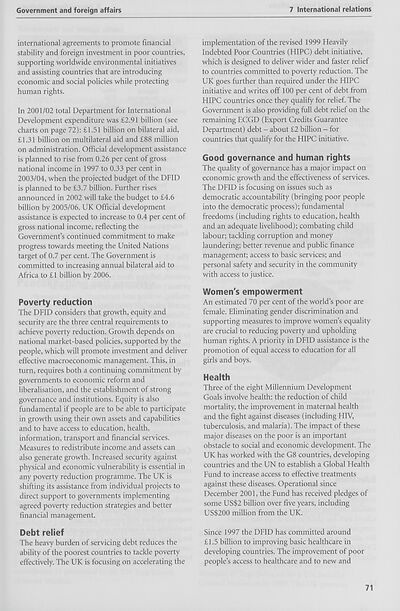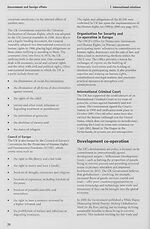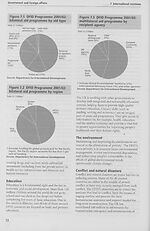Download files
Complete book:
Individual page:
Thumbnail gallery: Grid view | List view

Government and foreign affairs
7 International relations
international agreements to promote financial
stability and foreign investment in poor countries,
supporting worldwide environmental initiatives
and assisting countries that are introducing
economic and social policies while protecting
human rights.
In 2001/02 total Department for International
Development expenditure was £2.91 billion (see
charts on page 72): £1.51 billion on bilateral aid,
£1.31 billion on multilateral aid and £88 million
on administration. Official development assistance
is planned to rise from 0.26 per cent of gross
national income in 1997 to 0.33 per cent in
2003/04, when the projected budget of the DFID
is planned to be £3.7 billion. Further rises
announced in 2002 will take the budget to £4.6
billion by 2005/06. UK Official development
assistance is expected to increase to 0.4 per cent of
gross national income, reflecting the
Government’s continued commitment to make
progress towards meeting the United Nations
target of 0.7 per cent. The Government is
committed to increasing annual bilateral aid to
Africa to £1 billion by 2006.
Poverty reduction
The DFID considers that growth, equity and
security are the three central requirements to
achieve poverty reduction. Growth depends on
national market-based policies, supported by the
people, which will promote investment and deliver
effective macroeconomic management. This, in
turn, requires both a continuing commitment by
governments to economic reform and
liberalisation, and the establishment of strong
governance and institutions. Equity is also
fundamental if people are to be able to participate
in growth using their own assets and capabilities
and to have access to education, health,
information, transport and financial services.
Measures to redistribute income and assets can
also generate growth. Increased security against
physical and economic vulnerability is essential in
any poverty reduction programme. The UK is
shifting its assistance from individual projects to
direct support to governments implementing
agreed poverty reduction strategies and better
financial management.
Debt relief
The heavy burden of servicing debt reduces the
ability of the poorest countries to tackle poverty
effectively. The UK is focusing on accelerating the
implementation of the revised 1999 Heavily
Indebted Poor Countries (HIPC) debt initiative,
which is designed to deliver wider and faster relief
to countries committed to poverty reduction. The
UK goes further than required under the HIPC
initiative and writes off 100 per cent of debt from
HIPC countries once they qualify for relief. The
Government is also providing full debt relief on the
remaining ECGD (Export Credits Guarantee
Department) debt - about £2 billion - for
countries that qualify for the HIPC initiative.
Good governance and human rights
The quality of governance has a major impact on
economic growth and the effectiveness of services.
The DFID is focusing on issues such as
democratic accountability (bringing poor people
into the democratic process); fundamental
freedoms (including rights to education, health
and an adequate livelihood); combating child
labour; tackling corruption and money
laundering; better revenue and public finance
management; access to basic services; and
personal safety and security in the community
with access to justice.
Women's empowerment
An estimated 70 per cent of the world’s poor are
female. Eliminating gender discrimination and
supporting measures to improve women’s equality
are crucial to reducing poverty and upholding
human rights. A priority in DFID assistance is the
promotion of equal access to education for all
girls and boys.
Health
Three of the eight Millennium Development
Goals involve health: the reduction of child
mortality, the improvement in maternal health
and the fight against diseases (including HIV,
tuberculosis, and malaria). The impact of these
major diseases on the poor is an important
obstacle to social and economic development. The
UK has worked with the G8 countries, developing
countries and the UN to establish a Global Health
Fund to increase access to effective treatments
against these diseases. Operational since
December 2001, the Fund has received pledges of
some US$2 billion over five years, including
US$200 million from the UK.
Since 1997 the DFID has committed around
£1.5 billion to improving basic healthcare in
developing countries. The improvement of poor
people’s access to healthcare and to new and
71
7 International relations
international agreements to promote financial
stability and foreign investment in poor countries,
supporting worldwide environmental initiatives
and assisting countries that are introducing
economic and social policies while protecting
human rights.
In 2001/02 total Department for International
Development expenditure was £2.91 billion (see
charts on page 72): £1.51 billion on bilateral aid,
£1.31 billion on multilateral aid and £88 million
on administration. Official development assistance
is planned to rise from 0.26 per cent of gross
national income in 1997 to 0.33 per cent in
2003/04, when the projected budget of the DFID
is planned to be £3.7 billion. Further rises
announced in 2002 will take the budget to £4.6
billion by 2005/06. UK Official development
assistance is expected to increase to 0.4 per cent of
gross national income, reflecting the
Government’s continued commitment to make
progress towards meeting the United Nations
target of 0.7 per cent. The Government is
committed to increasing annual bilateral aid to
Africa to £1 billion by 2006.
Poverty reduction
The DFID considers that growth, equity and
security are the three central requirements to
achieve poverty reduction. Growth depends on
national market-based policies, supported by the
people, which will promote investment and deliver
effective macroeconomic management. This, in
turn, requires both a continuing commitment by
governments to economic reform and
liberalisation, and the establishment of strong
governance and institutions. Equity is also
fundamental if people are to be able to participate
in growth using their own assets and capabilities
and to have access to education, health,
information, transport and financial services.
Measures to redistribute income and assets can
also generate growth. Increased security against
physical and economic vulnerability is essential in
any poverty reduction programme. The UK is
shifting its assistance from individual projects to
direct support to governments implementing
agreed poverty reduction strategies and better
financial management.
Debt relief
The heavy burden of servicing debt reduces the
ability of the poorest countries to tackle poverty
effectively. The UK is focusing on accelerating the
implementation of the revised 1999 Heavily
Indebted Poor Countries (HIPC) debt initiative,
which is designed to deliver wider and faster relief
to countries committed to poverty reduction. The
UK goes further than required under the HIPC
initiative and writes off 100 per cent of debt from
HIPC countries once they qualify for relief. The
Government is also providing full debt relief on the
remaining ECGD (Export Credits Guarantee
Department) debt - about £2 billion - for
countries that qualify for the HIPC initiative.
Good governance and human rights
The quality of governance has a major impact on
economic growth and the effectiveness of services.
The DFID is focusing on issues such as
democratic accountability (bringing poor people
into the democratic process); fundamental
freedoms (including rights to education, health
and an adequate livelihood); combating child
labour; tackling corruption and money
laundering; better revenue and public finance
management; access to basic services; and
personal safety and security in the community
with access to justice.
Women's empowerment
An estimated 70 per cent of the world’s poor are
female. Eliminating gender discrimination and
supporting measures to improve women’s equality
are crucial to reducing poverty and upholding
human rights. A priority in DFID assistance is the
promotion of equal access to education for all
girls and boys.
Health
Three of the eight Millennium Development
Goals involve health: the reduction of child
mortality, the improvement in maternal health
and the fight against diseases (including HIV,
tuberculosis, and malaria). The impact of these
major diseases on the poor is an important
obstacle to social and economic development. The
UK has worked with the G8 countries, developing
countries and the UN to establish a Global Health
Fund to increase access to effective treatments
against these diseases. Operational since
December 2001, the Fund has received pledges of
some US$2 billion over five years, including
US$200 million from the UK.
Since 1997 the DFID has committed around
£1.5 billion to improving basic healthcare in
developing countries. The improvement of poor
people’s access to healthcare and to new and
71
Set display mode to:
![]() Universal Viewer |
Universal Viewer | ![]() Mirador |
Large image | Transcription
Mirador |
Large image | Transcription
The item on this page appears courtesy of Office for National Statistics and may be re-used under the Open Government Licence for Public Sector Information.
| Britain and UK handbooks > UK: The official yearbook of the United Kingdom of Great Britain and Northern Ireland > 2003 > (93) |
|---|
| Permanent URL | https://digital.nls.uk/204924316 |
|---|
| Attribution and copyright: |
|
|---|---|
| Description | Three volumes of 'UK: The official yearbook of the United Kingdom of Great Britain and Northern Ireland', published annually by the Office of National Statistics from 2002-2005. |
|---|---|
| Shelfmark | GII.11 SER |
| Description | Three titles produced by the British Government from 1954-2005 describing 'how Britain worked'. They are: 'Britain: An official handbook' (1954-1998), 'Britain: The official yearbook of the United Kingdom' (1999-2001), and 'UK: The official yearbook of the United Kingdom of Great Britain and Northern Ireland' (2002-2005). These 50 reports provide an overview of Britain's economic, social and cultural affairs, its environment, international relations, and the systems of government. They give an impartial summary of government policies and initiatives, and explain how public services are organised. |
|---|---|
| Additional NLS resources: |
|

